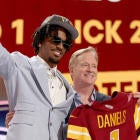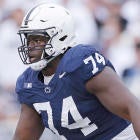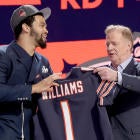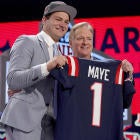Last week, we used this space to highlight the best free agency deals made on each side of the ball, from a tactical perspective. Teams like the Dolphins, Chargers, and Ravens found ways to upgrade their defense without unloading their entire stock of ammo, while the Browns, Bills, Jets, and Cardinals upgraded the infrastructure around their young quarterbacks, giving them a better chance of hitting their respective ceilings.
But while the first week of free agency most often brings with it the splashiest of signings, it's usually the second and third weeks where NFL teams find the best bargains. That's why we're here today. In the space below, we're going to take a look at some of the best second-wave bargain signings, where teams found needed upgrades without needing to break the bank.
Jordan Phillips, Arizona Cardinals
Phillips did not exactly shine during his nearly four-year stint in Miami, but he looked like a much different player after arriving in Buffalo. Last year was his best season yet, as he broke out with 9.5 sacks, 13 tackles for loss, and 16 quarterback hits from his position along the defensive interior. He should fill a similar role in Arizona to the one he played with the Bills, providing interior pressure as a complement to Chandler Jones in much the same way he did while working alongside Jerry Hughes and Shaq Lawson. The deal Phillips signed with the Cards is sizable (three years, $30 million), but the guarantee structure essentially makes it a two-year, $16 million bet with only a $4 million dead money charge at the end if Arizona doesn't like what it sees. And all that to cover the prime seasons (age 27-29) of Phillips' career.
Robby Anderson, Carolina Panthers
The 2020 wide receiver market was ... not strong. Combine that with what many consider arguably the best wide receiver draft class in recent memory and it's perhaps not surprising that outside of Amari Cooper, none of the free-agent wideouts really garnered all that much serious interest. That relative lack of interest is how the Panthers wound up landing Anderson on just a two-year, $20 million contract. His speed on the outside provides a strong complement to top options D.J. Moore and Christian McCaffrey, and should also help loosen things up for Curtis Samuel on the opposite side. Teddy Bridgewater is not the most aggressive downfield passer, but giving him multiple targets with dangerous speed to threaten the defense over the top or with catch-and-run abilities should help him succeed in his new role.
Emmanuel Sanders, New Orleans Saints
Speaking of affordable wide receivers, somehow, the Saints found a way to magic up the cap space to sign Sanders and give Drew Brees his most potent threat yet opposite Michael Thomas. Despite being mere months removed from Achilles surgery, Sanders had a strong season in Denver and San Francisco, looking like he still had plenty of gas left in the tank. He was a bit miscast as a true No. 1 option over the past couple years, but working as a complement to Thomas should give him more room to operate. Combining his precision route-running with Brees' incredible accuracy should somehow make the New Orleans offense even more efficient. And they only had to give him $16 million over two years.
Eric Ebron and Stefen Wisniewski, Pittsburgh Steelers
Ben Roethlisberger recently started throwing footballs again. He's always looked his best when well-protected by the offensive line, and when he's had a viable tight end to target over the middle of the field. Wisniewski was pushed into the starting lineup in Kansas City last season by virtue of several injuries, and he acquitted himself quite nicely. The Steelers landed him at a steep discount and he should slide right in between Maurkice Pouncey and Alejandro Villanueva on the left side of the line. In Ebron, Roethlisberger is afforded a more dynamic target than Vance McDonald, who had a sneakily nice season when Roethlisberger was last healthy in 2018. Combining them both allows the Steelers to break out some more of the dual-tight sets they used before Jesse James left for Detroit last offseason.
Breshad Perriman, New York Jets
There was supposedly mutual interest between the Jets and Anderson in a return to New York, but he left for a deal that seemed like a steal. The Jets quickly bounced back by signing Perriman to a one-year, $8 million pact, with only $6.5 million guaranteed. Perriman has struggled with injuries and inconsistency throughout his career but the final stretch of the 2019 season was the best he has ever looked. In the final five games of the year, Perriman totaled 25 catches for 506 yards and five scores. Granted, he was seeing the kind of target volume he seems unlikely to garner anywhere else (Jameis throwing a few picks a week certainly helped), but his speed helps replace what New York lost by letting Anderson leave. The Jets made it a priority early in free agency to give Sam Darnold better protection, but they badly needed to upgrade his weaponry. They probably still do, but this was at least a good start.
Ha Ha Clinton-Dix, Dallas Cowboys
Clinton-Dix signed a deal that is equal in average annual value ($4 million) to the one the Raiders gave the guy he's replacing (Jeff Heath). Even if you're not the biggest Clinton-Dix fan out there, that's a win for Dallas. The Cowboys still need to find a longer-term fit next to Xavier Woods at the safety position, but they at least have a starting-caliber player at that spot for next year, whether for a player they draft next year to develop behind, or as a place-holder until they find someone else next offseason. Finally making an investment at a position the organization ignored for far too long turns out to be a nice piece of business.
Andrew Billings and Karl Joseph, Cleveland Browns
I'm not entirely sure why the Bengals cast Billings aside. He's been a solid rotational piece after missing his rookie season due to injury, taking on more and more playing time with each passing season. He's not much of a pass-rush threat but in run-probable situations and/or early downs, he can take up space up the middle and make some plays in the backfield. He's also a good athlete and only 25 years old. At $3.5 million for one year, he's a bargain. The same is true of Joseph, who got $2.5 million for one year and should fit in nicely as a complementary piece in the team's secondary after falling out of favor with the Raiders. The Browns, like the Cowboys, still need a longer-term solution at safety, but having Joseph buys them a bit of time to find it.
Jayron Kearse, Detroit Lions
There was far more attention paid to the Vikings' other free-agent safety (Anthony Harris), and deservedly so. But Kearse fared well in his limited playing time last season, and looked like he may be able to handle a larger role if given the opportunity. He'll probably get it in Detroit, where the Lions traded Quandre Diggs last season and seem like they might be comfortable letting Tavon Wilson leave. The Lions also acquired Duron Harmon in a trade with the Patriots, but only have Tracy Walker and Will Harris as other viable threats to Kearse's potential playing time. He should be a solid piece, and the Lions only needed to pay $2 million for one year to find out whether he can be.






















